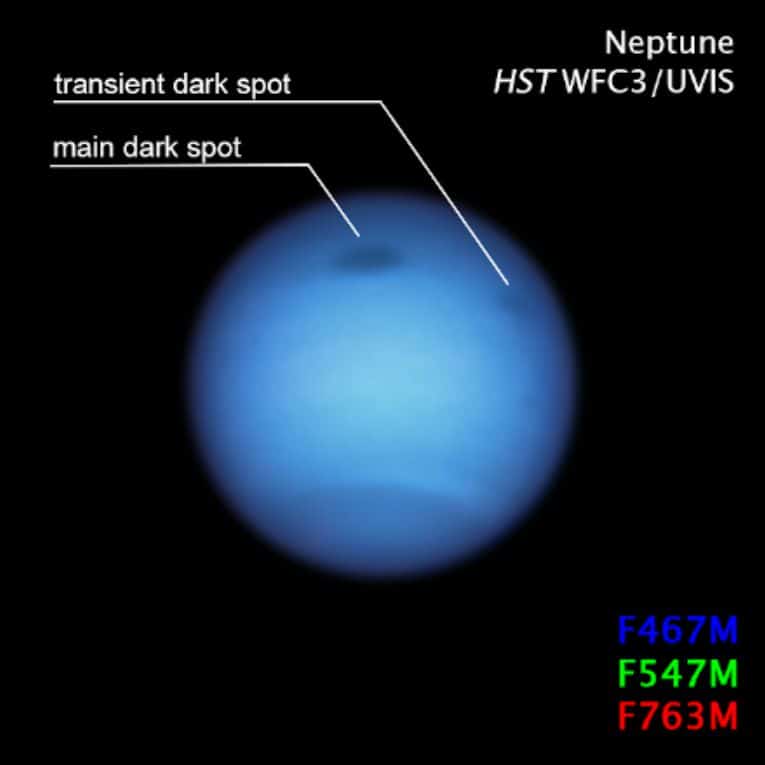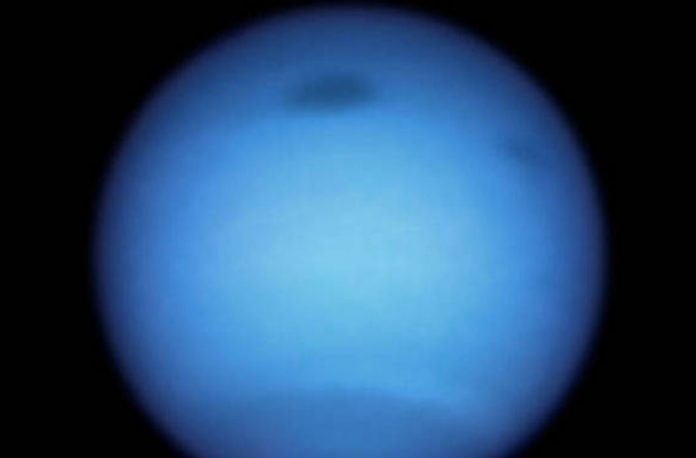Hubble has captured an unusual atmospheric behavior on Neptune: a great storm changes its course
Neptune is shaken by high-pressure systems, which can form in mid-latitudes. They are huge storms, called “Dark Spots“. It is not the first time that Hubble has evidence of one of these masses. However, his behavior is completely unusual.
This dark vortex has a surface greater than our Atlantic Ocean, with a width of 7,500 kilometers. It was first spotted in 2018 after forming in the Northern Hemisphere. The usual thing is that it would have gone down to the planet’s equator, where the “death zone” is located: the place where storms are destroyed.
This is due to the Coriolis effect, which makes objects moving on the radius of a rotating disk tend to get closer together. Because of this, the storm vortices end up disintegrating. But this time it was not.

NASA, ESA, STScI, MH Wong (University of California, Berkeley), and LA Sromovsky and PM Fry (University of Wisconsin-Madison)
Something never seen
Last August the storm stopped and turned north again. It is the first time in 30 years that Hubble has observed this atmospheric behavior.
“TThis is a process that’s never been observed. We have seen some other dark spots fading away, and they’re gone, but we’ve never seen anything disrupt, even though it’s predicted in computer simulations,” said Michael H. Wong, from the University of California, in a statement collected by ScienceAlert.
- Neuroscience Breakthrough: Study Pinpoints Brain Activity That Helps Prevent Us From Getting Lost
- Brief Anger Hampers Blood Vessel Function Leading to Increased Risk of Heart Disease and Stroke – New Study
- New Blood Test Pinpoints Future Stroke Risk – Study Identifies Inflammatory Molecules as Key Biomarker
- Enceladus: A Potential Haven for Extraterrestrial Life in its Hidden Ocean Depths
- New Experiment: Dark Matter Is Not As ‘DARK’ As All We Think
This change of direction occurred with the arrival of another “small spot”, about 6,000 kilometers in diameter. At NASA they named it ‘Dark Spot Jr.’
“We are excited about these observations because this smaller dark fragment is potentially part of the dark spot’s disruption process,” explained Wong.
The clouds disappear
It is not the only surprise that this dark vortex brought with it. Along with this, the bright clouds that accompanied it in its formation had disappeared. Apparently, they vanished when the storm halted their journey south.
Bright clouds form when airflow is disturbed and deflected upward over the vortex, likely causing the gases to freeze into methane ice crystals. The lack of clouds would reveal the blobs over-evolving, the researchers explained.
The great storm is the fourth dark spot Hubble observed on Neptune since 1993. Two other dark storms were discovered by the Voyager 2 spacecraft in 1989, but they disappeared before Hubble could observe them.
